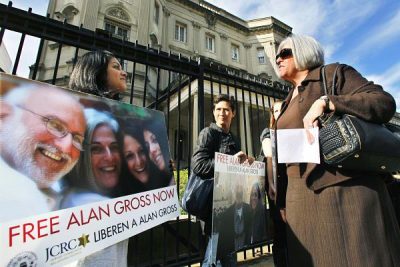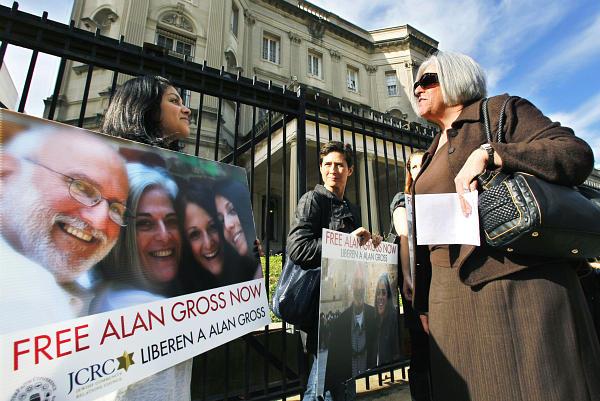 Beltway foreign policy analysts frequently praise the Obama administration for its “pragmatic” approach to world affairs. In dealing with Russia, China, or the economic crisis, the current White House has won plaudits for rejecting more ideological schools of thought in favor of evidence-based, flexible solutions.
Beltway foreign policy analysts frequently praise the Obama administration for its “pragmatic” approach to world affairs. In dealing with Russia, China, or the economic crisis, the current White House has won plaudits for rejecting more ideological schools of thought in favor of evidence-based, flexible solutions.
A pragmatic approach to foreign policy is by nature flexible, responsive to changes in the target country, clear in its interests and goals, and creative in its implementation.
In short, it’s everything the Obama administration’s approach to Cuba isn’t.
To be sure, in his first term, Obama showed pragmatism by eliminating travel restrictions that had only caused resentment on the island, in the Cuban-American community, and among academic, religious, and humanitarian constituencies in the United States. But after criticizing the Bush administration’s dogmatic policies of isolation, the Obama administration has adjusted course only at the margins.
In Its own universe
The worst managed issue between Cuba and the United States since 2009 has been the detention of USAID subcontractor Alan Gross, who has been imprisoned in a Cuban military hospital since December 2009. But instead of facing the facts, the Obama administration has created its own fictional narrative of the controversy, which contradicts even its own publicly available documents.
Alan Gross is an American international development expert who entered Cuba five times as an unregistered foreign agent. A USAID subcontractor, his mission was to create a wireless Internet satellite network based out of Jewish community centers to circumvent Cuban government detection. With the Cuban government well aware of the U.S. role in seeding the Stuxnet virus that nearly derailed Iran’s nuclear program, this was a huge red flag.
The USAID program was approved under section 109 of the Helms-Burton Act, a law explicitly committed to regime change in Cuba. Gross’ actions were covert. He never obtained the informed consent of the Cuban government or the Cuban Jewish community, which has always expressed opposition to the Helms-Burton law—particularly its attempt to politicize religious communities as tools to promote opposition groups.
Moreover, Gross didn’t know Cuba and didn’t speak Spanish. He was in over his head.
All this is well known, but Washington maintains that Gross was in Cuba as part of regular humanitarian programs. The United States insists that the international community simply misunderstands the Helms-Burton law, pretending that it’s about anything other than undermining Cuba’s sovereignty. USAID claims that Cuban civil society, religious groups, and even dissidents who criticize the Helms-Burton approach are mistaken. The Helms-Burton law helps them; they just don’t realize it.
A confidential document from a USAID task force associated with Gross’ work indicates a pattern of consistent misinformation. At the top of a list of go-to sources of information on Cuba, the program recommended the “Babalu” blog, an irrelevant website managed by rabid pro-embargo elements. The blog has called President Obama a “Marxist tyrant” and has also taken aim at Hillary Clinton, John Kerry, and various Cuban Americans who disagree with the editors’ McCarthyism. The fact that President Obama’s own USAID recommended Babalu as a reliable source of information is in itself grounds for closing the program until some adult guidance is guaranteed. Only on that planet was Alan Gross appropriately warned about the risks associated with his mission.
Time for a pragmatic approach
A pragmatic approach calls for looking at how Cuba’s government views the issue. The Castros didn’t get where they are without studying United States’ treatment of Cuba over the years. Declassified U.S. documents show that efforts to overthrow the Cuban government have at times been more sophisticated than what even communist propaganda denounced. Everything has been on the table, including using the mafia to kill Fidel Castro. Washington might consider the USAID Cuba project peaceful. But to expect the Cuban government to accommodate Washington’s designs for regime change is completely unrealistic.
Sunshine is the best disinfectant. If the guidelines and policies of the program that sent Gross to a Cuban jail were designed by Bush administration officials according to international law and American principles and values, why is the Obama administration’s USAID claiming government privileges to deny Gross a day in court for his claim against USAID that he wasn’t warned about the dangers of his assignment? Did Bush’s USAID have clear guidelines requesting the informed consent of every Cuban or American citizen involved in its program? Did Obama’s USAID change these policies after Gross was arrested?
There is an American citizen in a Cuban jail, and every day he spends there is an embarrassment to the U.S. government. Bringing Gross back home should take precedence over USAID’s deference to Senator Bob Menendez (D-NJ), the main opponent to a revision or cancellation of these provocative programs.
The Obama administration’s cordial attitude towards the Cuban-American old guard represents a bizarre ideological commitment to those who did everything possible to prevent Obama’s reelection. The hardliners’ insistence on rejecting negotiations in the Gross case is a transparent attempt to torpedo Obama’s overall approach of dialogue with U.S. adversaries, even when it clearly serves American national interests.
Whether U.S. diplomats realize it or not, the Obama administration’s insistence on Cuba’s unilateral release of Alan Gross makes U.S. policy look amateurish. It is true that the UN Group on Arbitrary Detentions declared that Gross’ trial was not fair, but almost the same was said about the “Cuban Five,” and the U.S. government has not shown any interest in revisiting their case. Even if Washington considers it unreasonable for Cuba to link Gross to the “Cuban Five” agents arrested in Florida, it makes no sense to put on hold constructive proposals for better relations in other areas. Obama’s legacy in the hemisphere will suffer if he wastes his second term flexibility to improve U.S.-Cuba relations because of unrealistic expectations. Incidentally, the probability of Gross’ release will improve as general relations do.
A central characteristic of pragmatism is the analysis of every challenge on its own merits without attempting to litigate, once again, yesterday’s battles. Continuing to operate our Cuba policy under an old and failed “regime change” strategy ignores the fact that the regime is going to change soon naturally. Moving toward a comprehensive policy of engagement now is in the national interest of the United States, and is certainly in the best interests of Alan Gross.
